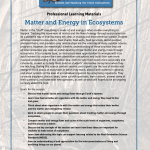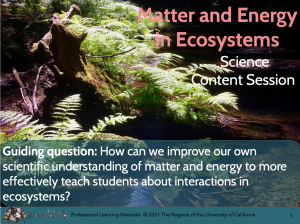Matter is the “stuff” everything is made of, and energy is what enables everything to happen. Tracking the movement of matter and the flow of energy through ecosystems can be a powerful way of sharing many key ideas in ecology and environmental science. Student activities related to ecosystems, food chains, food webs, food pyramids, decomposition, photosynthesis, and predator–prey relationships are the mainstay of many outdoor science programs. However, for meaningful scientific understanding of these and how they are all interconnected, you need an understanding of how matter and energy move through ecosystems. It’s a complex topic, so instructors need opportunities to wrangle with it as adult learners to uncover their own alternative conceptions and build their own more nuanced understanding of this critical idea—both to help them teach more accurately and coherently, as well as to help them build on students’ alternative conceptions when they are teaching. During this science content session, participants use the lens of matter and energy to think about an ecosystem in which they teach, about Earth systems in general, and about systems at the level of an individual organism by using living organisms. They co-create diagrams, discuss ideas, come up with questions, learn content, answer some of their questions, and leave with new questions, as well as what will hopefully be an ongoing curiosity about the topic.
Goals for this session are:
- Discuss how matter cycles and energy flows through Earth’s systems.
- Learn how food provides all organisms with the matter and energy they need to live and grow.
- Think about what organisms do with the matter and energy that enters their bodies and the matter and energy they release.
- Work in small groups to answer their questions about tracking matter and energy through ecosystems.
- Compare matter and energy flows and cycles at the scale levels of organisms, ecosystems, and the planet as a whole.
- Discuss the key concepts of the session and learn how these ideas are important for students to make sense of ecosystems.
- Learn how addressing this topic can support learning related to the Next Generation Science Standards (NGSS).
- Gain an understanding of and appreciation for the interconnectedness of living and nonliving things on our planet.


